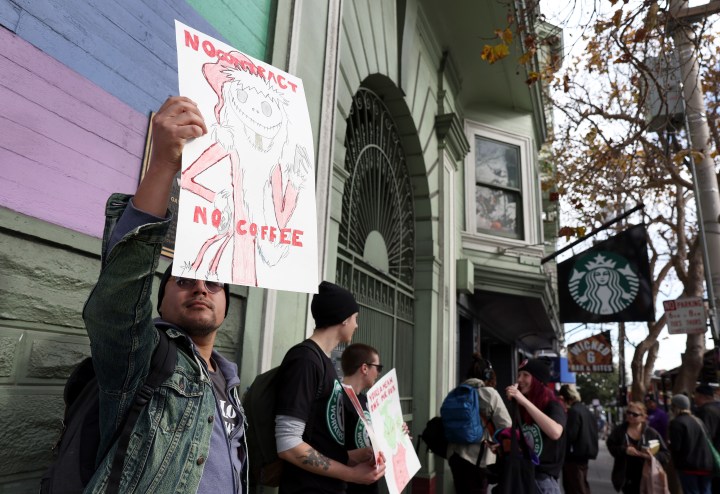
Unionized Starbucks workers at more than 100 stores strike
Unionized Starbucks workers at more than 100 stores strike

Unionized Starbucks workers at more than 100 locations around the country are walking off the job Thursday in what they’re calling the Red Cup Rebellion. Red Cup Day is a holiday promotion Starbucks has going today — giving away a free reusable cup — which typically draws big crowds, as free things do.
Striking workers are taking advantage of that spotlight to protest the company’s approach to union negotiations. At this point, more than 250 stores have unionized in a string of wins that has energized the labor movement. But each unionized store of one to two dozen workers must negotiate its own individual contract with the giant corporation.
When Starbucks stores were organized, the small scale of the efforts was a benefit, according to Rebecca Givan, a professor of labor relations at Rutgers University.
“Workers really know their co-workers,” she said. “They have the opportunity to talk to each other and get to know each other.”
But when it comes to negotiating a contract, smaller is not so advantageous with a company as big as Starbucks.
“They’re able to spend hundreds of dollars an hour on multiple lawyers in dozens of locations around the country,” Givan said.
Starbucks Workers United, the union representing about 6,000 workers, says the company is using those resources to stymie the process.
It’s been almost a year since the first store — in Buffalo, New York — voted to unionize, and no contracts have been agreed to yet.
“That’s not unusual at all,” said Michael Zinser, an attorney who represents management in newspaper union negotiations. “In the collective bargaining world, in the first time contract, 11 months, it’s not that long. Because of how, you know, you’re starting from scratch.”
First contracts require back-and-forth over every word. Starbucks says the union has delayed the process by asking for virtual meetings instead of in-person ones.
But employers tend to have a bigger interest in slowing things down, said Ruth Milkman, a labor sociologist at CUNY. “Taking advantage of all the potential opportunities to delay things and drag it out in the hopes that somehow the whole thing will fade away,” she said.
Drawn-out negotiations can be demoralizing and give management more of an upper hand, Milkman added — especially if the country goes into a recession.
There’s a lot happening in the world. Through it all, Marketplace is here for you.
You rely on Marketplace to break down the world’s events and tell you how it affects you in a fact-based, approachable way. We rely on your financial support to keep making that possible.
Your donation today powers the independent journalism that you rely on. For just $5/month, you can help sustain Marketplace so we can keep reporting on the things that matter to you.










